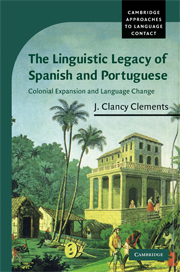Book contents
- Frontmatter
- Contents
- List of figures
- List of maps
- List of tables
- Series editor's foreword
- Acknowledgements
- List of abbreviations and acronyms
- 1 Language contact, language learning, and language change
- 2 The general socio-historical context of Portuguese and Castilian
- 3 Portuguese- and Spanish-lexified creole languages
- 4 Bozal Spanish of Cuba
- 5 Chinese Coolie Spanish in nineteenth-century Cuba
- 6 Chinese Immigrant Spanish
- 7 Andean Spanish
- 8 Barranquenho
- 9 Contact, cognition, and speech community
- Appendix A
- Appendix B
- Bibliography
- Author index
- General index
Series editor's foreword
Published online by Cambridge University Press: 30 September 2009
- Frontmatter
- Contents
- List of figures
- List of maps
- List of tables
- Series editor's foreword
- Acknowledgements
- List of abbreviations and acronyms
- 1 Language contact, language learning, and language change
- 2 The general socio-historical context of Portuguese and Castilian
- 3 Portuguese- and Spanish-lexified creole languages
- 4 Bozal Spanish of Cuba
- 5 Chinese Coolie Spanish in nineteenth-century Cuba
- 6 Chinese Immigrant Spanish
- 7 Andean Spanish
- 8 Barranquenho
- 9 Contact, cognition, and speech community
- Appendix A
- Appendix B
- Bibliography
- Author index
- General index
Summary
The series Cambridge Approaches to Language Contact was set up to publish outstanding monographs on language contact, especially by authors who approach their specific subject matter from a diachronic or developmental perspective. Our goal is to integrate the ever-growing scholarship on language diversification (including the development of creoles, pidgins, and indigenized varieties of colonial European languages), bilingual language development, code-switching, and language endangerment. We hope to provide a select forum to scholars who contribute insightfully to understanding language evolution from an interdisciplinary perspective. We favour approaches that highlight the role of ecology and draw inspiration both from the authors' own fields of specialization and from related research areas in linguistics or other disciplines. Eclecticism is one of our mottoes, as we endeavour to comprehend the complexity of evolutionary processes associated with contact.
We are very proud to add to our list J. Clancy Clements' The linguistic legacy of Spanish and Portuguese, a very informative account of, first, the evolution of Portuguese and Spanish from Latin and, then, their subsequent transformation into several non-European varieties. The general perspective throughout the book is that of colonial expansion, language spread, language contact, and language shift. Without explicitly espousing uniformitarianism, Clements highlights the role of substrate influence through naturalistic second language acquisition, as well as the particular ways in which the external ecologies of language contact variably constrain the significance of this particular factor, against inheritance from the lexifier, in the relevant evolutionary processes.
- Type
- Chapter
- Information
- The Linguistic Legacy of Spanish and PortugueseColonial Expansion and Language Change, pp. xiii - xivPublisher: Cambridge University PressPrint publication year: 2009



